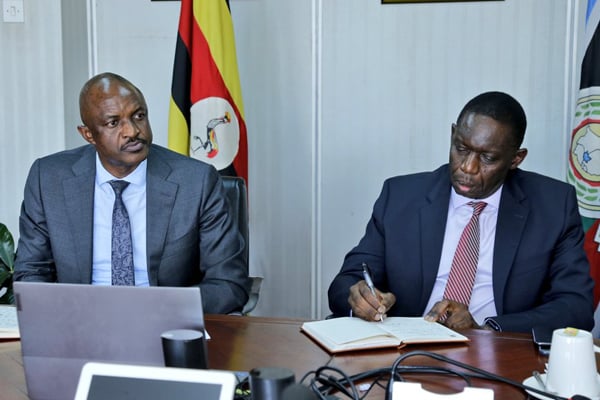Museveni lists 5 drivers to economic growth

President Museveni (left) arrives at Speke Resort Munyonyo on January 19, 2023 for the second Africa High-Level Forum on South-South and Triangular Cooperation (SSTrC). PHOTO/ ISAAC KASAMANI
What you need to know:
- The President says global affluence, commercial agriculture, manufacturing, a robust service sector and ICT are key indicators for sustainable development.
BY
President Museveni has outlined five major points that must be achieved so as to attain sustainable economic development globally.
According to the President, global affluence, commercial agriculture, manufacturing, a robust service sector in the form of tourism, medical care, education for all and Information Communications Technology are key indicators for sustainable development.
“It’s now time to address global affluence, we do not want personal affluence and when we talk of global affluence, we mean good food, clothes, shelter, transport, adequate access to energy and health; the government and private agencies must engage in research of nature,” he said.
The President was speaking at Speke Resort Munyonyo yesterday at the closure of the second Africa High-Level Forum on South-South and Triangular Cooperation (SSTrC) for Sustainable Development 2023.
Mr Museveni also said in order to sustainably attain economic development, water sources and the environment must be preserved.
“Use fossil fuels safely because once these resources are used up, they cannot be replaced, which is a major problem for humanity, use clean energy and fight pollution of chemicals and plastics,” he said.
The President tasked the Forum to stimulate trade.
“South to South corporation should ensure on affluence of our people, the issue of market is very crucial, fortunately in Africa, we are working on that issue through continental free trade area, but what about South to South, we need to solve this issue of trading together and buying from one another and this will stimulate prosperity,” he said.
Forum highlights
Mr Amos Lugoloobi, the State Minister for Finance (Planning) and the national focal person of the African Peer Review Mechanism, said the key highlights of the Forum deliberations included strengthening cooperation among the countries in the global south and exploring ways to make the implementation of development agendas more robust.
“Uganda has been ably represented at this Forum and we have shared information on various Ugandan success stories, challenges and made proposals for accelerating the south-south cooperation for socio-economic transformation in Africa,” he said.
Prof Pamela Mbabazi, the chairperson of National Planning Authority, said the Forum was timely at the time of major global political, epidemiological and environmental crises.
“This Forum also gives us the opportunity to discuss ways of tapping the significant potential for SSTrC in Africa that remains untapped due to insufficient political support, inadequate policy and regulatory frameworks, disconnection between SSTrC initiatives and local realities, and inadequate funding,” she said.





